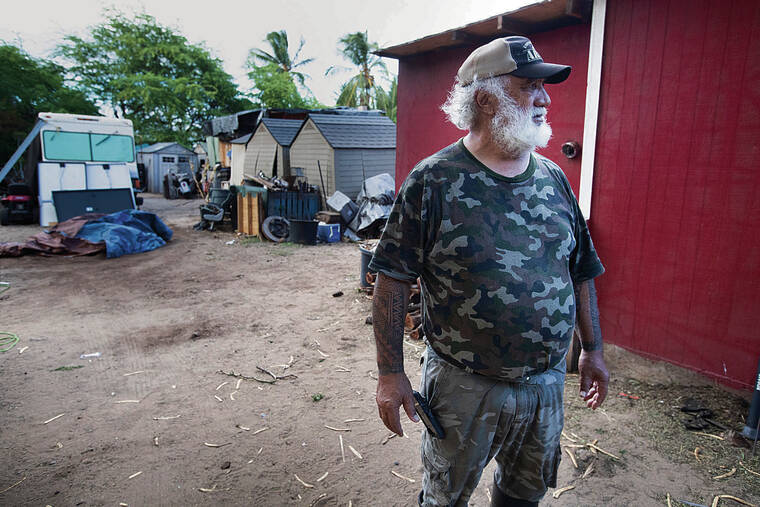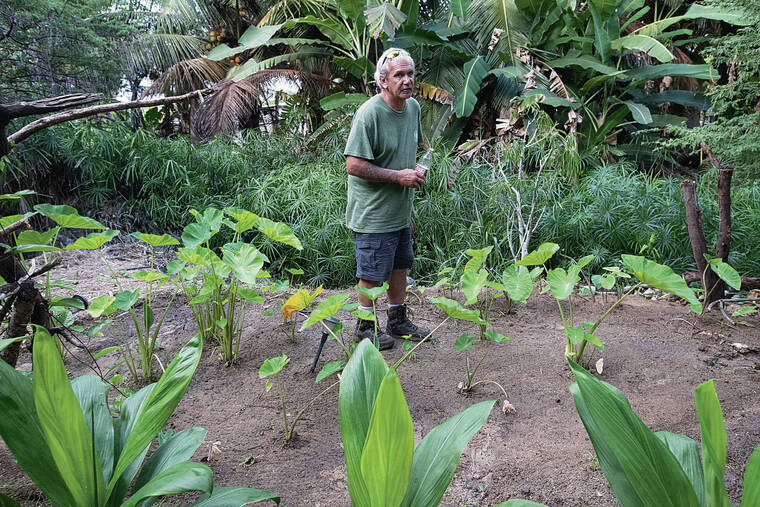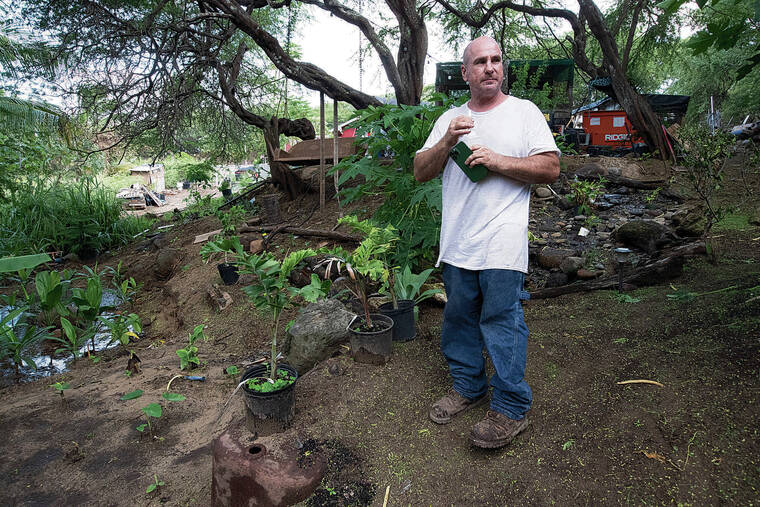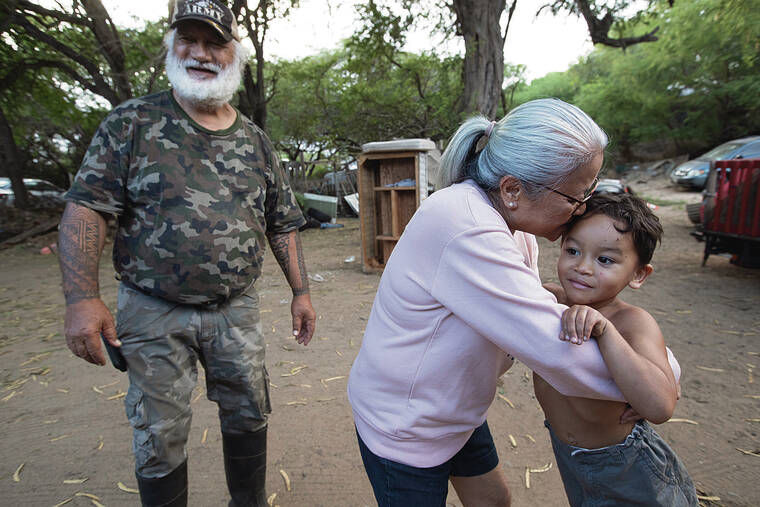WAILUKU >> Senior Pastor Laki Ka‘ahumanu of the Church on the Go and his wife, Malie, who have been ministering to Maui’s homeless individuals and families for years, now are seeing the homeless crisis worsen due to the thousands of Maui residents who were displaced by the Aug. 8 wildfires.
The couple have provided shelter to the homeless for decades on various church grounds and in their own homes. They now house people in structures in the expansive backyard of their Wailuku home, which has land planted with taro and other crops to feed people and help connect them to their culture.
They view it as part of their ministry to provide shelter to battered women, homeless women with children, underprivileged and disadvantaged people, and now occasionally fire survivors, who haven’t been able to get disaster relief yet or for various reasons have been turned down.
The need is great as the fire wiped out an estimated 3,000 homes and apartments in Lahaina, and many Lahaina residents still lack longer- term housing and have been bouncing around from place to place.
“Homelessness has always been a problem, not only for us, but for the whole world,” he said. “Disasters happen. We have to malama the aina and the kanaka — our people. God (loves) everybody. No matter what they go through, we need to help them.”
Ka‘ahumanu, a Native Hawaiian, has been recognized for his good works by the state House of Representatives and by Maui Mayor Alan Arakawa, who proclaimed Jan. 30, 2016, as Laki Pomaikai Ka‘ahumanu Day. But he identifies with those he helps as he comes from humble origins and understands the power of God-given second chances.
“My father once stole a can of Spam to feed his wife and three kids,” Ka‘ahumanu said.” He tied ropes around our house when the floor was collapsing from termites.”
Ka‘ahumanu said by age 9 he was already an alcoholic, drug user and thief. He said things spiraled even more out of control after he returned from serving in Vietnam.
In 1979 he was arrested for growing more than 800 cannabis plants on his family’s land in Kihei. He was granted a deferred acceptance of a guilty plea and probation, but that was revoked after his 1983 arrest for the sale of cocaine and related offenses.
Ka‘ahumanu said the judge wanted to make an example out of him and sentenced him to 50 years, with a 10-year minimum requirement. While serving time, he said, he accepted Jesus and his life turned around.
“While in jail, I said, ‘Lord if you can use someone this stupid, please use me for your will,’” Ka‘ahumanu said.
He was released in 1986 after serving just 22 months of his sentence. Ka‘ahumanu said it was then that God began to work even more miracles in his life. He has written some of them down in a pamphlet titled “From Green Fields of Marijuana to Prison Greens and Beyond,” and he said that he is working on a book. He says it’s a “true story of a failed life to redemption and triumph.”
He still finds it wondrous that he became a licensed minister of the Church of God and served at churches in Makiki, Hauula, Lanai City, Lahaina and now at the Church on the Go. He said that he was eventually pardoned by Gov. Ben Cayetano, which he said he is thankful for because it allowed him to go into prisons to minister to inmates.
“I want to give them hope,” he said.
Malie Ka‘ahumanu said one way they want to give people hope is by ministering to those experiencing homelessness.
“We understand what people are going through because we have gone through it,” she said.
Laki Ka‘ahumanu said experiences in the couple’s own life called them to the biblical scripture John 10:10, “That ye may have life and have it more abundantly.”
He tells the story of his relationship with Eric Vida, who took care of him and his wife when they were homeless and is now living at their property trying to get back on his own feet.
Laki Ka‘ahumanu said the relationship between him and Vida illustrates that “the more you give, the more God gives you.”
Vida said he went to live with the Ka‘ahumanus about four years ago after he broke his back and was addicted to pills. He said they’ve helped him heal, and he is giving back by using his agricultural skills to develop their land so that they can save money on groceries as well as grow produce to sell and help support the ministry.
Malie Ka‘ahumanu said the parable of giving also applies to how the couple’s ohana has grown. Though they never had biological children, they have taken in and cared for at least 16 children, three of whom they have legally adopted.
“Our ohana just keeps growing,” she said hugging a little boy named Humble, whose parents they are sheltering. “I’ve been blessed to be able to love so many children.”
The couple and those they shelter expect more in need will come due to the direct and indirect impacts of the fires.
William Emmsley, who moved to Maui in 1996 and has lived with the Ka‘ahumanus on and off for years, said finding affordable housing on Maui has always been hard, but the fire has made it worse.
“Papa (Laki Ka‘ahumanu) helped me and my family when we never have nothing. When came and was hard for get job, and then when I did get job, it wasn’t good enough to pay rent,” Emmsley said. “He took me in and gave me one place for me and my three children and my wife.”
Emmsley said the family saved and was able to move out. However, he eventually moved back into the Ka‘ahumanus’ home after he became disabled and couldn’t work, and was grappling with rising Maui rents.
“They raised my rent for a two-bedroom in Harbor Lights in Kahului from $800 to $1,000 and then $1,500,” he said.
Emmsley said rents have risen even higher since the wildfires.
“These people really need help,” he said, adding that his daughters and so many other family members and friends were directly affected by the Lahaina fire. “It’s sad when you no can help friends and family who lost everything. It’s hard.”
Brandon Milligan, who has lived at the Ka‘ahumanus’ for two years, said even before the Maui fires affordable housing was an issue. He said he was living in the bush when Vida, a friend, saw he was in need and brought him to the Ka‘ahumanus’ home.
“Most everybody has two jobs or is staying with family or someone that they know. If something happens it’s almost impossible to get back on your feet,” Milligan said. “Now it’s even harder. There’s more competition for places to stay.”








